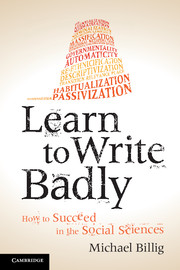Book contents
- Frontmatter
- Contents
- Acknowledgements
- 1 Introduction
- 2 Mass publication and academic life
- 3 Learning to write badly
- 4 Jargon, nouns and acronyms
- 5 Turning people into things
- 6 How to avoid saying who did it
- 7 Some sociological things: governmentality, cosmopolitanization and conversation analysis
- 8 Experimental social psychology: concealing and exaggerating
- 9 Conclusion and recommendations
- References
- Index
3 - Learning to write badly
Published online by Cambridge University Press: 05 June 2013
- Frontmatter
- Contents
- Acknowledgements
- 1 Introduction
- 2 Mass publication and academic life
- 3 Learning to write badly
- 4 Jargon, nouns and acronyms
- 5 Turning people into things
- 6 How to avoid saying who did it
- 7 Some sociological things: governmentality, cosmopolitanization and conversation analysis
- 8 Experimental social psychology: concealing and exaggerating
- 9 Conclusion and recommendations
- References
- Index
Summary
No one is born with the ability to produce the convoluted sentences that academic social scientists regularly write. This bad writing is highly educated. Academic social scientists will have typically spent the greater part of their lives in education, passing every possible exam. Accordingly, the problem of writing badly cannot lie in a lack of education, but in the sorts of education that social scientists have received. So, we need to see what literary skills young social scientists are expected to acquire and how these skills, even if they do not aid clear thinking, may help to bring them success in the business of being social scientists.
A number of years ago, the great French sociologist, Pierre Bourdieu, claimed that academic language was ‘a dead language’, because it was ‘no-one’s mother tongue, not even that of the children of the cultivated class’ (Bourdieu, Passeron and de Saint Martin, 1996, p. 8). We can ask how young apprentice academics take on this dead language, imparting to it some sort of life and, in return, giving their lives to this language. Actually, the phrase ‘dead language’ is misleading, because, as I hope to show in later chapters, academic language is not quite as dead, or as detached, as Bourdieu imagined. Nor is it actually a language: in order to write academically, one has to use the same grammatical rules, turns of phrase and words, especially verbs, which ordinary people use for non-academic purposes. In the case of academic English – the most widespread of all current academic languages – its apparently dead aspects are parasitic on a language that is very much alive.
Information
- Type
- Chapter
- Information
- Learn to Write BadlyHow to Succeed in the Social Sciences, pp. 40 - 66Publisher: Cambridge University PressPrint publication year: 2013
Accessibility standard: Unknown
Why this information is here
This section outlines the accessibility features of this content - including support for screen readers, full keyboard navigation and high-contrast display options. This may not be relevant for you.Accessibility Information
- 1
- Cited by
